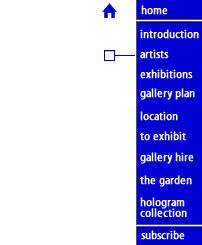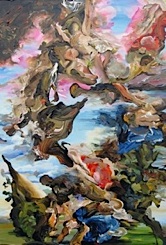


RECENT WORK
by
IAIN ANDREWS
10th - 31st March 2009
EXTENDED UNTIL 25th APRIL 2009
Gallery closed 7th - 16th April
Private Views took place on:
Tuesday March 10th 6.30 - 8.30pm
and
Sunday March 15th 12.00 - 3.00pm
when the artist was in attendance
Viewing by appointment at other times
For further information contact Jonathan Ross:
by e-mail or phone 020 7370 2239
We live at a time where shifting cultural assumptions have shattered fixed notions of continuity and value. The essential truths that Postmodernism has denied - love, evil, death, the sacred, morality and soteriology have become absent from much contemporary art as they have from wider contemporary culture. Yet Postmodernism's failure to offer consolations or answers to these enduringly relevant subjects means that as an artist, an awareness of modern developments must be balanced by a dialogue with established traditions and past narratives, and yet not become nostalgic. Terry Eagleton, and Peter Fuller have both argued for the importance of art to be able to tackle these big subjects. Whereas in the past, the artist or thinker had the shared symbolic order provided by religion within which to refer and ground their work, the artist today must find a way of surviving the bewildering plurality and subjectivity that has become the norm, if the truth of what they have to say is to maintain any force or credibility.
My paintings begin as a dialogue with an image from art history - a painting by an Old Master that may then be rearranged or used as a starting point from which to playfully but reverently deviate. My recent work is concerned with the struggle to capture the relationship between the spiritual and the sensual, apparent opposites that are expressed in my work through the conflict of high narrative themes and sensuous painterly marks. The sheer enjoyment of making these marks is not intended to be a Dionysian pursuit that drowns out the appearance of the real through a curtain of subjective, expressionistic gestures, but rather an attempt to transform and redeem the form through the act of making. Fuller talks about how, in the past the artist could 'transform the physically perceived by the manifestation of allegoric devices like haloes and 'human' wings, whereas now this can only be realized through the transfiguration of formal means like drawing, colour and touch' . The act of making becomes inseparable from the message that is being conveyed through the marks, one of the importance of transformation and redemption.
It is vital that pictures are not sedatives, but are capable of evoking sensation and awakening feelings. I hope to frustrate the process of recognition through treading a path that plays between the borders of figuration and abstraction, and thus slow down the viewer by creating a space for sensation to emerge. I want my works to be sensuously addictive, worldly and material, yet also to have a sense of contemplative silence akin to a religious icon.
I currently work as an artist in residence and Art Psychotherapist at Trinity High School in Manchester.
Iain Andrews, March 2009
Peter Fuller - Images of God, Hogarth press, p.61